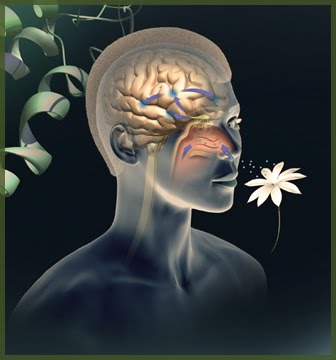Smell and Olfaction are called the “chemical senses” because they both result from the effects of molecules of chemical compounds on receptor cells. Whether to detect a dangerous gas leak or to savor the rich aroma of a cup of coffee, the sense of smell plays an important role in most people’s lives. Our experience of smell or olfaction results from the stimulation of receptor cells in the nose by chemical molecules in the air. When the molecules reach the olfactory neurons, located high in the nasal cavities, they trigger a message that is sent to the olfactory bulb in the brain.
Although the human sense of smell is not as acute as that of dogs and many Other animals, it remains quite keen. For example, the average person can detect even one small drop of perfume that is diffused through a house. There are about 10 million olfactory neurons in our nasal cavities. (Dogs have about 20 times as many.) These receptor cells are the only neurons in the body that regenerate, replacing themselves every month or two. Thus, people whose ol- factory neurons arc damaged, such as by a blow to the head, may regain their sense of smell when new neurons grow and establish links to the proper area of the brain.
Although people can detect the differences between hundreds or even thousands Of odors, we can name only a much smaller number of odors. Our ability to discriminate odors clearly outstrips Our ability to label them.Some people are much better than others in detecting and identifying odors. Richard Dory and his colleagues gave a scratclvand-sniff test to more than 2,000 women and men from four groups: white Americans, black Americans, Korean Americans, and native Japanese. In all four groups, the women out performed the men. Women’s superiority in smell may be based at least in part on an inborn biological difference between the sexes. Bur other differences between people in the ability to detect smells seem to result from experience.
For example, both cigarette smokers and people who live and work with smokers have been found to have a dulled sensitivity to Odors, apparently as a result of prolonged exposure to cigarette smoke . Not surprisingly, the sense of smell takes on special importance for people who have lost the use of one or more Of their other senses. More than a century ago, William James described a blind woman who worked in the laundry of a mental hospital and who was able to sorr the laundry of rhe patients on the basis of smell alone, even after the clothes had been washed.
More recent research has confirmed that blind adults are better than sighted adults at identifying odors.who was both blind and deaf, the sense of smell provided “images” and memories that other- wise would be lacking. She described smell as “a potent wizard that transports us across thousands Of miles and all the years we have lived. The Odors of fruit waft to me in my southern home, to my childhood frolics in the peach orchard.” For all of us, as for Helen Keller, odors can elicit memories of joy or of grief.
Olfaction And Smell;Need To Know The Difference
Some smells are highly pleasurable experiences think of the scent of an alluring perfume or the aroma of fresh-baked bread. Other smells, such as rotten meat or bad breath, are perceived as unpleasant or even disgusting. These preferences are not inborn but are acquired as a result of our growing up in a particular culcure. Children have few preferences among odors.
As they get older, more preferences develop. And Scents that are perceived as pleasant in one culture may be perceived as unpleasant in another. Fortunately, we adapt to smells that we are exposed to for an extended period of time, so after a while we are hardly ,are Of them. Sewer workers have little problem with the strong smells to which they are exposed. And a dentist we know, who spends a lot of time in close contact with people’s mouths, reports that he is virtually unaware of the powerful odors emanating from them.

